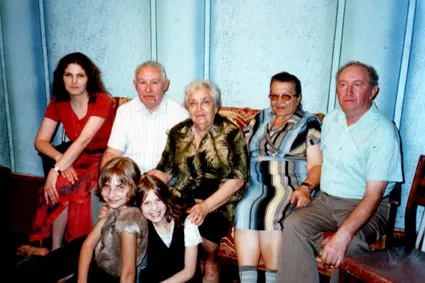This is my family. From left to right: my younger son Mikhail's wife Lilia Pizman (nee Weinstock), I, my wife Riva, my younger brother David's wife Anna Pizman, my brother David Pizman. Mikhail's daughters are in the foreground: Tatiana (left) and Nathalia. This photo was taken in Mogilyov-Podolskiy in 1998.
In 1955 I went to work at the food industry equipment plant in Mogilyov-Podolskiy and worked there 46 years. I started as a laborer, then I worked as a tinsmith and a mechanic. I joined the party in 1958. In 1960 the plant sent me to study in Moscow extramural all-Union machine tool College. I passed my entrance exams to the College and entered the machine tool manufacture faculty. On 13 April 1964 my brother and I obtained diplomas of production technicians of instrument manufacture. I was promoted to the shop production engineer and soon afterward I became a shop foreman. In 1969 I was appointed tool shop superintendent. I was always interested in design. Few years later I went to work as a design engineer in the design office of the plant.
We didn't celebrate Jewish holidays, but we celebrated Soviet holidays at home and at work. We had guests at home. On 1 May and 7 November my wife and sons and I went to parades with other employees of the plant. On Victory Day, 9 May, we went to the meeting with veterans of the war on bank of the Dnestr, near the tank that was the first to enter Mogilyov-Podolskiy on 19 March 1944. We also celebrated New Year and family birthdays. We usually spent family vacations at the seashore in the south.
My younger son Mikhail went to work at the design office of our plant. My son is a very talented engineer. In 1986 Mikhail married Lilia Weinstock, a local Jewish girl. They had a secular wedding. My son and his wife decided to live separately from us. In 1988 their older daughter Tatiana was born and in 1992 - their younger daughter Nathalia. Lilia is a housewife. Mikhail works at the plant. Mikhail has been fond of poetry since childhood and composed poems. He recently had a book of his poems published and the book had positive references from critics. We often visit Mikhail and his family, and our granddaughters often come by. They play the violin. Tatiana finished a music school and took part in contests of violinists. This year she is finishing school, and will go to a music vocational school. Our younger daughter studies in a music and general education schools. She goes on tours with our town ensemble of violinists.
My brother went to work as a dispatcher at this same plant. He was doing well at work. In 1965 my brother married Anna Narolskaya, a Ukrainian girl from Mogilyov-Podolskiy. They had a secular wedding. My brother went to work at the wine factory in Bronnitsa village near the town. In 1969 my brother's first baby was born. He was named Nathan, after our mother - the first letters of their names are the same. My brother's daughter Zhanna was born in 1972. During perestroika, when an anti-alcoholic campaign began, many vines were destroyed and wineries closed. My brother's factory was closed. My brother went to work as a production engineer in the assembly shop at the plant. In the late 1980s my brother and his family emigrated to Israel. They live in Ashdod. David and his wife Anna are pensioners. David's son Nathan perished in the Israel army in 1992. Zhanna is married. She and her husband work. Zhanna has two children. My brother became religious after our mother died. He learned Ivrit, read the Torah, celebrated Sabbath and Jewish holidays and followed the kashrut and continued this in Israel. We correspond, but my rather hardly writes anything about their life and his family. We rather have a theoretical correspondence: I stand to my atheist views and my brother defends his religious views.





















